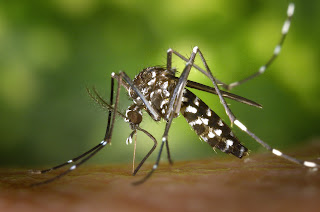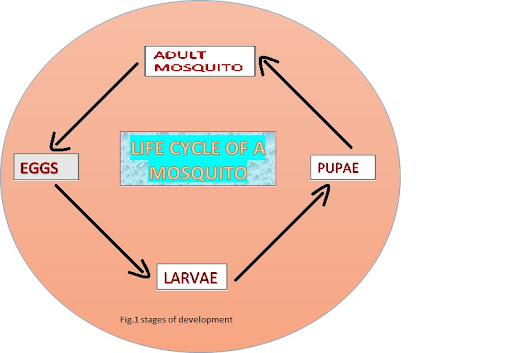Know all about Dengue fever
The mosquitoes are mostly found in tropical and subtropical climates in urban or suburban areas.
There are multiple factors responsible for
the growth of mosquitoes and this, in turn, poses a hazard to the health in the
form of many viral infections.
 |
| Image source: pexels |
There are many mosquito-borne diseases such as Malaria,
Dengue fever, Chikungunya, Yellow Fever Zika Virus, etc. Dengue is a
mosquito-borne viral disease, transmitted by a female mosquito named Aedes
Aegypti. This mosquito also causes Chikungunya.
Let us learn more about Dengue fever.
According to CDC( Centres for Disease Control and
prevention), almost half of the world's population resides in the
"dengue-risk areas". Dengue is a major illness in such risk areas
which creates a burden on the health system.
Dengue is caused by a Flavivirus named Dengue Virus or DENV,
which has four serotypes. The virus is transmitted by the mosquito bite in a
person, the virus thus enters the bloodstream and the infection spreads in the
body through infected blood.
Dengue fever affects the general health of the body and
produces mild to severe symptoms. There are no specific treatments for the cure
of any type of dengue fever. The treatment is given as per the symptoms.
Symptomatic treatment is the main focus where attention is given to provide
comfort to the patient and reduce the level of viral load in the blood.
Signs and Symptoms:
Many might have seen the patients infected with the dengue
virus. They describe the symptoms of the disease as follows:
- Fever: high-grade fever with chills
- Development of skin rashes all over the body which starts appearing two to three days following the infection
- Joint pain and muscle pain. Comes all of a sudden which is extremely painful. Involves the wrists, shoulders, elbow, and knee joints
- Severe headache: many people describe it as a hammering headache or intolerable type of headache
- Retro-orbital pain
- Extreme fatigue
- Nausea and Vomiting. See also Diarrhea
- Loss of appetite
- Thrombocytopenia: the level of platelets drop considerably faster in dengue
- Bleeding from the mucous membranes.
- Petechiae
- Abdominal pain in some cases.
Some people may remain undiagnosed as they are subclinical cases who don't even know they have infection present in the body, some may have mild flu-like symptoms that usually go away within five to seven days. The clinical cases of dengue fever exhibit the above-mentioned symptoms. The person may recover within a week to ten days if prompt treatment is given. Preventing dehydration and maintaining the body vitals is an essential part of the treatment.
Causes and risk factors:
Dengue is caused by the DENV virus. It is transmitted
through a mosquito bite. The female mosquito belonging to the species Aedes
Aegypti acts as a vector. When the mosquito (containing virus) bites a person,
it transmits the virus into the bloodstream of that person and then the virus
reproduces within the body to produce the illness, Dengue Fever.
Areas with risk of dengue: places where the climate is
suitable for, allowing the mosquitoes to breed
Areas with poor hygiene and sanitation: the slums in
underdeveloped countries or areas with low sanitation levels often become
hotspots for such mosquitoes. The condition offers them favorable conditions to
grow and reproduce. Damp areas, water-filled pits, or garbage act like their
breeding homes.
The tropical and subtropical climates are more suitable for the mosquitoes making these high-risk zones.
Age: It can affect any age. However, those with low or
compromised immunity levels are at greater risk of contracting dengue fever
Kids are more at risk as they play in gardens or parks where
there are chances of more mosquito
Poor drainage facilities also make a way for the mosquito
gathering and it can develop a risk for those poor people who sleep on the
footpaths of the towns.
Collecting garbage on the terrace. Rainwater gets collected
into them and allows the mosquitoes to breed.
Mode of Transmission of Dengue Virus:
The dengue virus is transmitted from human to mosquito to human cycle. The humans with dengue viremia are bitten by the adult mosquitoes and this, in turn, infects the mosquito which when bites another person, transmits the virus to a new host.
Host-vector-host transmission, the direct human to human transmission of the dengue virus is not possible or known.
Making it a bit simpler: let's understand how can a mosquito bite infect humans?
Stages of the life cycle of Mosquito:
Eggs----larvae-----pupae----adult-mosquito
The eggs laid by the female mosquito in dry containers or places with some humidity get a chance to grow when they are in the water. So after rainfall, we say there is a menace of mosquitoes. Rainwater acts as a source of their development and the aquatic stages turn the larvae (floating into the water) into pupae which is an advanced stage. The pupae mature leaving the outer coat and become adult mosquitoes that can now fly in the air.
We all have seen a lot of hoardings and notices from the
government sectors saying do not accumulate water in the garbage or waste
materials on your terrace, or periodically clean all your water-storing
containers. This is because the stagnant water supplies a favorable environment
for the eggs to hatch and form a mosquito.
Diagnosis:
Physical assessment and history of the patient's illness is taken
to diagnose the condition.
Complete blood count tests must be done to reach the
diagnosis of dengue fever. A decrease in platelet levels is a sign of dengue
infection. It continues to decrease daily until the patient recovers.
Serology tests are done to detect the serotype of the dengue
virus.
Treatment:
As such there are no specific treatments to cure or treat the dengue infection.
- Symptomatic treatment is given to the patients.
- Paracetamol is the drug of choice in managing the pyrexia or fever and body aches.
- Antibiotics are administered to reduce infection. Intravenous therapy may be given to maintain the hydration of the body. Adequate rest and sleep are advised to reduce the weakness and fatigue.
- Vital signs are recorded at regular intervals.
- Fluid intake and urine output chart is maintained to know the level of hydration.
- Most of the cases usually recover within a week of treatment. It becomes difficult to manage the advanced stages of dengue fever such as Dengue haemorrhagic fever and dengue shock syndrome. The considerably low levels of platelets cause internal bleeding leading to the severe condition called haemorrhagic fever.
Dengue shock syndrome is a fatal condition that requires
immediate attention. Following the dengue haemorrhagic fever and due to the
circulatory failure as well as excessive bleeding, the person may enter into a state
of delirium, stupor, and unconsciousness due to the shock. It is an emergency
situation that demands urgent medical intervention.
Prevention of Dengue Fever:
The following preventive measures can prevent the
transmission of dengue fever:
- The prevention is aimed at blocking the breeding and spread of mosquitoes. Vector prevention is a strategic effort aimed at disease prevention.
- Below are some of the tips to prevent mosquito-spread, breed, or bite.
- Evacuate any garbage filled with water.
- Clean the overhead water tanks or the containers used for storing water periodically.
- Keep the water-stored containers covered properly.
- Use mosquito repellents such as anti-mosquito creams, liquid fumes, and coils to destroy or kill the mosquitoes.
- Sleep under mosquito nets to prevent mosquito bites.
- Ensure cleanliness inside and outside your house.
- Wear full-sleeved clothes and trousers to prevent mosquito bites.


Comments